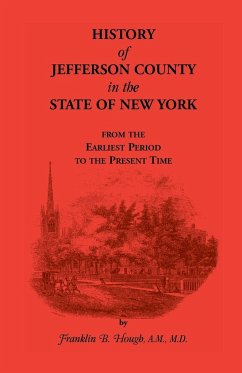
The Personnel of George Rogers Clark's Fort Jefferson and the Civilian Community of Clarksville
Versandkostenfrei!
Versandfertig in 1-2 Wochen
25,99 €
inkl. MwSt.

PAYBACK Punkte
13 °P sammeln!
Until now, only thirty-five persons were thought to have occupied the frontier outpost known as Fort Jefferson. Newly discovered records found in the unpublished George Rogers Clark Papers at the Virginia State Library prove that more than five hundred persons garrisoned, lived, farmed and died in this remote settlement. The economic vouchers and records of George Rogers Clark open a new window on the lives of the people who inhabited this fort. We can reconstruct their activities by noting what kind of cloth they required for their clothing; what provisions were required to outfit a military ...
Until now, only thirty-five persons were thought to have occupied the frontier outpost known as Fort Jefferson. Newly discovered records found in the unpublished George Rogers Clark Papers at the Virginia State Library prove that more than five hundred persons garrisoned, lived, farmed and died in this remote settlement. The economic vouchers and records of George Rogers Clark open a new window on the lives of the people who inhabited this fort. We can reconstruct their activities by noting what kind of cloth they required for their clothing; what provisions were required to outfit a military expedition; who got married and who was court-martialed. Genealogists can find the names of their ancestors among the lists in this volume and in the index. Re-enactors can formulate accurate portrayals based upon the descriptions of clothing and accoutrements. The book begins with a roster of names in the List of Companies. This is followed by the alphabetical List of Families. A chronological List of Deaths and a calendar of Fort Jefferson activities rounds out this section. The main portion of the book is made up of the Personnel section. It provides an alphabetical listing of every individual known either to have set foot in Fort Jefferson or to have had direct ties with the fort (such as sending items to the post or receiving correspondence from its inhabitants). Contents of personal correspondence reveal fears of Indian attacks, conditions at other forts, and accounts of military movements. The author is the director of the Murray State University anthropology program and the MSU Archaeology Service Center. The Fort Jefferson research project, of which this book is a part, involves the search for archaeological evidence of the fort as well as archival and historical studies directed toward reconstructing every facet of life associated with this late eighteenth-century Kentucky military and civilian frontier settlement.







![Abstracts from the Clarksville [Texas] Standard (formerly the Northern Standard) Cover Abstracts from the Clarksville [Texas] Standard (formerly the Northern Standard)](https://bilder.buecher.de/produkte/39/39713/39713005n.jpg)
![Abstracts from the Clarksville [Texas] Standard (formerly the Northern Standard) Cover Abstracts from the Clarksville [Texas] Standard (formerly the Northern Standard)](https://bilder.buecher.de/produkte/39/39712/39712678n.jpg)
![Abstracts from the Clarksville [Texas] Standard (formerly the Northern Standard) Cover Abstracts from the Clarksville [Texas] Standard (formerly the Northern Standard)](https://bilder.buecher.de/produkte/40/40308/40308499n.jpg)




